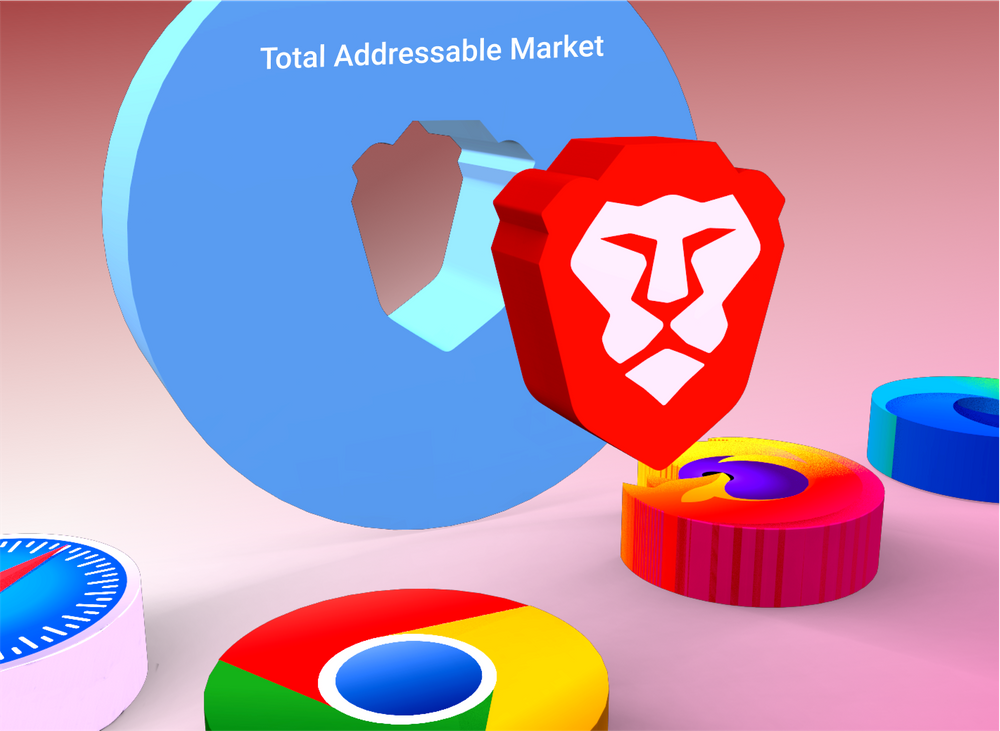As of today, Coinbase tracks the price of 4,683 cryptocurrency assets. Compare that to the measly 180 currencies recognized by the United Nations and we quickly see how "crypto" has become hard to track or even take seriously. I mean, many of these are literally a dime a dozen. Even less. Then a news anchor tells us that a single Bitcoin is worth $60k and we're supposed to believe it. Who gets to say what this stuff is worth, anyways? I think that's a great question so today I want to invite you to consider an old way to evaluate these newfangled things.
Product. Market. People.
Our adventure starts in a different domain – venture capital investing. When evaluating a new product or business to invest in, a venture capitalist generally does so from three vantage points. They look at the:
- Product, which is the invention, process or service that a business offers.
- Market, which is the public appetite for that product, and
- People, which is the team that produces said product.
While different investors and entrepreneurs will weigh the value of any of these differently, at the end of the day, these three elements determine the fate of a business. Andy Rachleff, the CEO and co-founder of Wealthfront, explains it like this:
“When a great team meets a lousy market, market wins. When a lousy team meets a great market, market wins. When a great team meets a great market, something special happens.”
In other words, you can't sell a refined product no one wants but you can sell an unrefined product everyone wants. And it sells even better once perfected. If this is true of products and businesses in general, then surely we can evaluate cryptocurrency projects in the same way. Let's do just that.
Assessing the Brave Browser | Product
At its simplest, Brave is a web browser like Chrome or Firefox. However, unlike other browsers, Brave focuses on user privacy. Considering moments like the 2017 Equifax data breach, or that apps have been tracking top pentagon officials for years, people are wising up to the danger of entrusting anyone with their data. Brave, for its part, is built to remove privacy invading advertisements from our use of the open web. The tricky part is that a lot of free and useful services are funded through ads. Think local and national news in addition to things like Google Search or Facebook Marketplace.
Brave's solution to this thorny problem is to rebuild ad targeting in a way that preserves user privacy while still being useful to advertisers. The result is a browser that loads websites faster and actually pays you to look at ads. That's right, for every dollar an advertiser spends on a Brave Ad, targeted users earn 70 cents in a crypto token called Basic Attention Token. The marriage of this token with the browser forms the launch point of several other products:
- The crypto version of Patreon: Patreon is a membership platform that helps creators and artists earn a monthly income by providing rewards and perks to their subscribers. Brave has a similar product called Brave Creators that allows users to automatically contribute money to verified content publishers. Contributions can be sent once, on a recurring basis or as a fraction of monthly time spent viewing a publisher's content.
- The crypto version of Venmo/Cash App: Venmo is a mobile payment service that allows account holders to transfer funds to others via a phone app. Brave has a similar product launching in a few months called the Brave Wallet that will allow users to send or receive cryptocurrency.
- The crypto version of Google Search: Brave has acquired a privacy focused search engine which they are modifying to launch as Brave Search.
- A version of Coinbase: Coinbase is an exchange that makes it easy to buy and sell cryptocurrencies. Brave is launching a similar service called Brave DEX that will run natively in one of its browser tabs.
- A VPN service: Brave’s Firewall + VPN is a premium service that encrypts and anonymizes web traffic.
- Video chat: Brave has launched and is still refining Brave Together which is a private video conferencing replacement for the likes of Google Meet or Zoom.
Market
People hate ads. Over 763 million devices were blocking them in Dec 2019. This cost publishers $21.8 billion in 2015 in missed ad revenue and that number was projected to rise to $78 billion globally last year (I could not find actualized numbers). Unlike traditional ad blockers, Brave is the only one that provides a privacy respecting ad network alternative, an industry first win-win for users and publishers.

Brave had 29 million monthly users as of March, 2021. That's up about 3 million from last month. Compare that number to each of these related or soon to be related services:
- Patreon: Has 6 million patrons. Patreon has 200 thousand creators compared to Brave's 1 million publishers which include Wikipedia, Vimeo, The Guardian, Washington Post, NPR, and Parler.
- Venmo: Has 40 million active accounts.
- Google Search: The undisputed king in search with over 1 billion monthly active users, Google also boasts over 4 million advertisers. However, advertisers are taking Brave seriously. They've already served ads for brands such as Verizon, Amazon, The Home Depot, The New York Times, Progressive Insurance, Newegg, Chipotle, Lenovo, and Grubhub, to name a few. The average click-through rate for a Brave Ads campaign is 9%, well above the industry average of just 2%, with many brands observing even higher engagement.
- Coinbase: This company, which became publicly traded today, has 6.1 million monthly active users.
Finally, although Brave is not a cryptocurrency itself, its Basic Attention Token (BAT) competes on stage with other crypto assets. Bitcoin, the most famous of all, has a market capitalization of $1.2 trillion compared to BAT's $2.1 billion. That means Bitcoin is about 500 times more capitalized than Basic Attention Token. However, Bitcoin's number of daily users is about 400 thousand while Brave Browser's daily user count is 9.8 million. Admittedly, many of those users do not currently use BAT. Even so, the barrier to entry is quite low – literally three mouse clicks away from opting in. There is no need to connect a bank account or even remember a password. This easily positions Brave as a dominant future purveyor of crypto assets, primarily in the form of BAT.
People
Finally, Brave is led by an extremely competent team:
- Brendan Eich as Founder. He invented JavaScript, the Internet’s most widely used programming language. He also co-founded Mozilla, the organization behind Firefox.
- Brian Bondy as Founder & CTO. Previously held senior software development roles at Khan Academy, Mozilla & Evernote.
- Yan Zhu as Chief Information Security Officer. She previously built solutions at the Electronic Frontier Foundation and is a contributor to HTTPS Everywhere, SecureDrop, as well as the Tor Browser Bundle.
- Ben Livshits as Chief Scientist. His published works in software vulnerabilities have been cited over 4,300 times.
- Brian Brown as Chief Business Officer. He has raised hundreds of millions in venture capital, bought and sold companies, and holds several patents in hardware and cleantech.
- Bill Engles as CFO. He has previously served as CFO for a semi-conductor trading platform, a luxury goods online marketplace, a blockchain-based fantasy sports league, and an oil and gas tech company.
Risks
Any candid evaluation of a company or product acknowledges risk. Because Brave's Basic Attention Token is built and transacts on Ethereum – an independent project – it is exposed to any issues or outages that the Ethereum network endures. Ethereum is slated to undergo a major version upgrade over the coming year – a change that is expected to bring many performance improvements to the underlying transaction layer. Any issues with the upgrade will almost certainly affect BAT users.
Brave also faces a lot of competition from incumbent players such as Google and potentially Facebook - two companies who are willing to copy products they deem threatening or valuable. First, the most obvious, Google Chrome and Search remain a dominant market leader in their respective product categories. Google has also appointed Brave's former Chief Product Officer, David Temkin, as its Director of Product Management for Ads Privacy and Trust. Finally, the company has rolled out its response to privacy concerns in the form of a new tracking technology dubbed Federated Learning of Cohorts (FLoC).
Facebook forms a risk to the Brave project on account of continued work toward their cryptocurrency project, Libra. Originally announced in 2019, the project received enough government and social push back that plans for the currency were shelved. Since then, the 27 member Libra Association – involving companies like Uber, and Spotify – have picked up the cause to launch a scaled down version of the product in 2021. While such a move can popularize cryptocurrency use, it is not clear how much this may help or hurt Brave's effort to make the web a more private place.
Something Special Is Happening
As Andy pointed out earlier, when a great team meets a great market, something special happens. I personally have that feeling about Brave. While many see the public market debut of Coinbase as an inflection point for digital currencies, I have my doubts. It's progress, indeed, but no watershed moment. Creating any useful currency has many challenges, one of the largest of which is successfully connecting a two-sided market. No customer will purchase products with invented money if only a few merchants accept it but no merchants will accept invented money if only a few customers have it. Brave, with its 29 million engaged monthly users and 1 million BAT accepting publishers, is growing tantalizingly closer to solving that problem.
I do believe this qualifies Brave and its accompanying Basic Attention Token as one of the most if not the most successful crypto project to date. Sure, you wouldn't know it from Elon Musk's twitter feed but the team and product/market fit is there. For these reasons I think it's safe to say that BAT, currently trading at $1.47, is presently valued several if not many multiples below what it will some day achieve. It's also possible that I am completely wrong since, after all, the future is a lovely mystery. Even so, my closing hope is that I've demystified how one may systematically asses the value of a cryptocurrency. It's true that a lot of cryptocurrencies are tethered to hype but some have genuine value.


